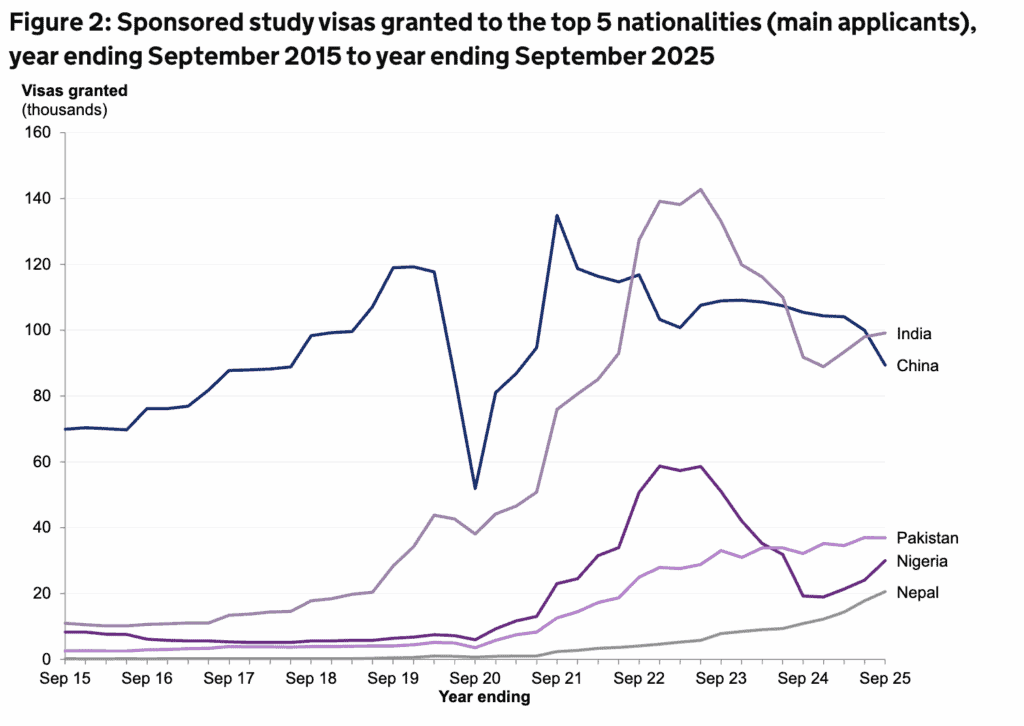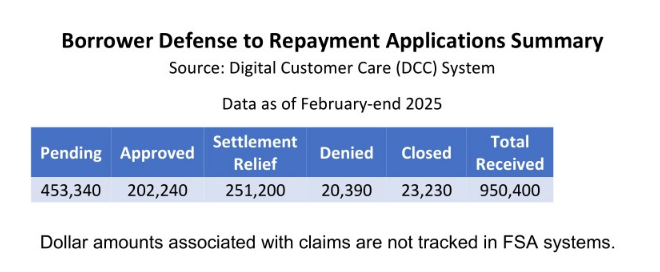Monday marked the end of the first year of President Donald Trump’s second term, and higher education is still reeling from months of nonstop federal whiplash and policy changes.
The Trump administration has used wide-ranging and unprecedented tactics to gain influence over the academic sector and advance its policy goals. In turn, some college leaders have been forced to decide between defending their institution’s independence and policies or yielding to the federal government’s demands due to financial pressure.
Below, we’re breaking down some of the biggest impacts of the second Trump administration’s first year, number by number.
150+
The number of investigations the Trump administration either opened into colleges or cited while warning of a potential loss of federal funding.
In March, the U.S. Department of Education put 60 colleges on notice over ongoing Title VI probes into allegations that they weren’t doing enough to protect Jewish students from discrimination or harassment. Title VI bans federally funded institutions from discriminating based on race, color or national origin.
U.S. Secretary of Education Linda McMahon warned the colleges, many of whose investigations predated Trump’s second term, that federal funding “is a privilege” that is “contingent on scrupulous adherence to federal antidiscrimination laws.”
Less than a week later, the Education Department opened 51 additional investigations into colleges over allegations they had programs or scholarships with race-based restrictions for participation or eligibility. The agency again cited potential Title VI violations, along with a February guidance letter aimed at snuffing out diversity, equity and inclusion efforts. That guidance was ultimately struck down in August by federal courts.
Several well-known colleges were named in both sets of investigations, including Yale, Cornell, Tulane and Arizona State universities.
Since last March, the Trump administration has opened additional college investigations over institutional policies that run antithetical to the president’s higher education agenda, such as allowing transgender students to play on sports teams aligning with their gender identity.
6
The number of colleges that have publicly brokered deals with the Trump administration to settle allegations of civil rights violations.
Most of the institutions — Brown University, Columbia University, Cornell University, Northwestern University, and the University of Pennsylvania — each faced hundreds of millions of dollars in frozen or canceled federal funding. By settling with the Trump administration, university leaders sought to restore their funding and remove political targets from their institutions.
The remaining institution, the University of Virginia, still had its funding intact but faced five federal investigations that could have threatened access to such funds. The U.S. Department of Justice paused those probes with the promise of closing them if the university “completes its planned reforms prohibiting DEI” through 2028.
But many higher education experts have decried such agreements as violating academic freedom and emboldening the Trump administration’s assault on the sector.
In one deal, Columbia University agreed to pay the federal government $221 million — the most of any college so far — and implement sweeping policy changes. Those included reporting extensive admissions data to the Trump administration, socializing “all students to campus norms and values” via training, and allowing an independent monitor to oversee the university’s compliance with the agreement.
The settlement will also put up walls between Columbia and international students by requiring the university to reduce its financial dependence on their tuition dollars and making applicants declare why they wish to study in the U.S.
In contrast, Harvard University sued the Trump administration over its attempts to exert influence over the institution. Thus far, the courts have largely sided with Harvard. A federal judge blocked the government’s attempts to revoke the university’s ability to enroll international students and ruled against its decision to withhold $2.2 billion of Harvard’s funding.
15%
The amount the Trump administration sought to unilaterally cap colleges’ reimbursement rates for indirect research costs.
Four federal agencies — the National Institutes of Health, the National Science Foundation, and the U.S. departments of Energy and Defense — introduced nearly identical 15% cap policies in quick succession during the first half of 2025.
Research universities, higher education groups and states sued over the changes, and federal courts have so far blocked all four policies. Earlier this month, a federal appeals court upheld a lower court decision permanently blocking NIH’s policy, the first the Trump administration pursued. NIH declined to comment earlier this month on whether it planned to appeal.
21%
The decrease in federal funding for scientific research the Trump administration sought for the fiscal year 2026 budget. Some agencies would have seen particularly large decreases. Under Trump, NSF requested a budget of $3.9 billion — less than half of what it received in fiscal 2025. Similarly, NIH’s head requested $27.9 billion, nearly 40% less funding than the prior year.
Congressional lawmakers have instead passed their own bipartisan funding proposals that reject these broad-based cuts. Congress has until Jan. 30 to pass a full budget for the fiscal 2026 year before a stopgap funding measure expires.
7
The number of agreements the Education Department publicly struck with other federal agencies to offload some of the responsibilities under its purview.
The move came after Trump signed an executive order in March directing McMahon to “take all necessary steps to facilitate the closure” of the department.
The full closure of the Education Department would need congressional approval. But the Trump administration has sought to hollow out the department to the “maximum extent appropriate and permitted by law,” according to the executive order.
In November, the Education Department announced interagency agreements with the U.S. departments of State, Interior, and Health and Human Services to do this work. The U.S. Department of Labor is also set to receive additional education programming oversight after it took on key federal workforce developments from the Education Department earlier in the year.
Under the November agreements, the State Department plans to take over administration of the Fulbright-Hays grant, a program that funds educators’ overseas research and training in non-Western foreign languages and area studies. The Education Department canceled the program for the 2025 fiscal year.
Additionally, the Labor Department plans to oversee a majority of federal postsecondary education grant programs. The Trump administration said in December that the agency had finished taking over the federal workforce development programs established under the Workforce Innovation and Opportunity Act.
And beginning Tuesday, employees in the Higher Education Programs division in the Education Department’s postsecondary education office will be assigned to the Labor Department.
1,300+
The number of Education Department employees the Trump administration fired amid a massive reduction in force in March. Between the layoffs and employee buyouts, the department slashed its employee count from just over 4,100 to about 2,800.
In October, the Trump administration then moved to fire another 466 Education Department employees amid the longest government shutdown in U.S. history.
Both rounds of layoffs spurred court battles, which are still ongoing. However, the U.S. Supreme Court gave the Education Department the green light in July to carry on with the first round of layoffs as the lower courts consider their legality.
At the start of December, the department called some Office for Civil Rights employees back to work after nearly nine months. The staff had been on paid leave during that time, while the Trump administration legally defended the March layoffs.
And earlier this month, the administration stopped defending its October round of layoffs in court, appearing to scrap its efforts to push the terminations through.
8,000+
The rough number of student visas revoked by the State Department under the Trump administration, according to a January social media post from the State Department. At least 200 to 300 of those visas stemmed from terrorism-related claims, an agency representative said in August.
In the first half of 2025, the administration canceled the legal status of hundreds of international students in a federal database, often without formally notifying them or explaining why. Lawsuits over the decisions began to pile up, and the federal government announced in April it would temporarily reverse the cancellations pending the adoption of a formal policy.
It never publicly shared how many students were affected. But shortly afterward, court documents revealed a Trump administration policy proposal that would significantly expand the U.S. Immigration and Customs Enforcement’s power to terminate students’ legal status.
The Trump administration also made headlines over the high-profile detentions and attempted deportation of international and noncitizen students who had criticized Israel’s war in Gaza and related U.S. foreign policy.
Rumeysa Öztürk, an international student at Tufts University, became one of the faces of this trend when plainclothes immigration authorities detained her in March. The Trump administration had revoked her visa earlier that month, a decision Öztürk has argued was not communicated to her and stemmed from a pro-Palestinian op-ed she co-authored in 2024.
Within 24 hours of her detention, the federal government had moved Öztürk from Massachusetts to a notorious ICE facility in Louisiana, all without charging her with a crime, the American Civil Liberties Union said at the time.
Öztürk spent six weeks detained before a federal judge ordered her release on bail in May. Her case is ongoing.
The Trump administration also detained Mahmoud Khalil, a former graduate student at Columbia, under similar circumstances. However, Khalil is a permanent legal U.S. resident.
In 2024, he served as the lead negotiator for Columbia University Apartheid Divest, a coalition of student organizations that helped organize the pro-Palestinian encampment on the university’s campus.
Like Öztürk, Khalil was detained in March 2025 by plainclothes ICE agents and moved hundreds of miles to a detention facility in Louisiana.
Khalil was detained for three-and-a-half months, missing the birth of his child and his Columbia graduation, before a federal judge ordered him to be released in June. He has sued the government, alleging he was falsely imprisoned and unlawfully targeted over his free speech.
However, a panel of federal appeals judges struck a blow to Khalil’s case Thursday, ruling that the lower court that ordered his release didn’t have the jurisdiction to do so.
Stanford University’s independent student newspaper, with assistance from the Foundation for Individual Rights and Expression, is also suing top Trump administration officials over allegations that their attempts to deport student visa holders based on speech violated their rights to free expression and due process.
A federal judge overseeing a similar case said Thursday that he would restrict the government’s ability to deport members of the American Association of University Professors and the Middle East Studies Association. The professional nonprofits filed a lawsuit last year alleging the Trump administration has been attempting to deport faculty and students over protected speech.
7
The number of states the DOJ has sued over laws or policies allowing certain undocumented students to pay in-state tuition at public colleges.
The eligibility requirements vary from state to state, but in each instance, DOJ leaders have argued that the laws illegally offer undocumented students benefits not provided to all U.S. citizens.
The agency filed the first such lawsuit in June against Texas. Texas Attorney General Ken Paxton, instead of defending the law, signed a joint motion with the DOJ to have it struck down. Texas was the first state to extend eligibility to undocumented students 25 years ago.
Since then, the DOJ has sued California, Illinois, Kentucky, Minnesota, Oklahoma and Virginia over their laws or policies granting certain undocumented students eligibility for in-state tuition.
In Democratically controlled states, like Illinois and California, local officials have sworn to fight the federal lawsuits.
But in Virginia, outgoing Republican Attorney General Jason Miyares filed a motion siding with the DOJ and seeking to strike down his state’s law. A federal judge has yet to rule on that motion.
As of Jan. 16, 22 states and Washington, D.C., had policies allowing undocumented students to pay in-state rates at some or all public colleges, according to the Higher Ed Immigration Portal. That’s down from 24 states before Trump won a second term.












